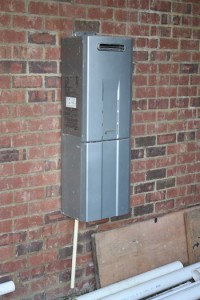Recently, we have seen a number of water damage losses stemming from gas-fired and electric tankless water heaters exposed to freezing temperatures. Tankless hot water heaters have been growing in popularity and use due to their energy savings over traditional water heaters. These units are typically installed on the exterior of a home or business in areas of the country where prolonged freezing or extremely low temperatures are not common.
In one case, a homeowner was out of town and returned to discover hot water running into their home from broken pipes located 10 feet away from the exterior wall. The pipes inside the home and the pipes at the water heater discharge were not properly insulated. The temperature the night before had dropped into the teens, and the water in the pipes near the tankless water heater froze. The frozen water expanded downstream, rupturing the pipe at its weakest point. When the temperature warmed back up the pipe thawed and started leaking.
Unlike conventional water heaters, tankless water heaters only turn on when there is a need for hot water. Tankless water heaters do not have a pilot light nor a tank that must be continuously heated to maintain hot water. Therefore, if no one uses hot water for an extended period of time, such as when sleeping overnight, the unit will not generate any heat. Some tankless water heaters are equipped with a freeze protection electric heater and insulation that prevents freezing inside the unit down to as much a -30°F, depending on wind and other conditions. However, the electric heater only provides protection to the internal components of the water heater.
Piping and valves external to the heater but connected to the heater must be protected by insulation and/or separate electric heaters. But what happens if there is a power loss in conjunction with extremely low temperatures? Obviously, the system will be unprotected when this happens. Alternative protection methods could include opening a faucet and letting a small stream of hot water flow continuously to reduce the potential of freezing. For cold climates, some manufacturers recommend the installation of an optional drain down system. This system, if installed, will allow all water inside the unit to drain out if there is a power outage or a component failure in the product.
We have seen several types of failure modes associated with tankless hot water heaters exposed to freezing temperatures. If you have a case involving a frozen tankless water heater, please call or email us at Warren.
John Phillips, senior consulting engineer at Warren, has more than 30 years of crane and heavy equipment experience and more than 17 years of experience in forensic engineering. A licensed professional engineer in South Carolina, North Carolina, Georgia, Louisiana and Ohio, he’s NCEES registered both as a model engineer and with The United States Council for International Engineering Practice, USCIEP. John has designed crane systems, supervised installation, tested and certified lifting equipment even serving as a project engineer for maintenance and certification of nuclear weapon lifting and handling systems. John is a certified fire and explosion investigator and fire and explosion investigator instructor by the National Association of Fire Investigators. John is a member of the American Society of Materials and American Society of Testing and Materials, as well as a voting member of ASTM Ships & Marine Forensic Sciences, Forensic Engineering, and Performance of Buildings committees.





